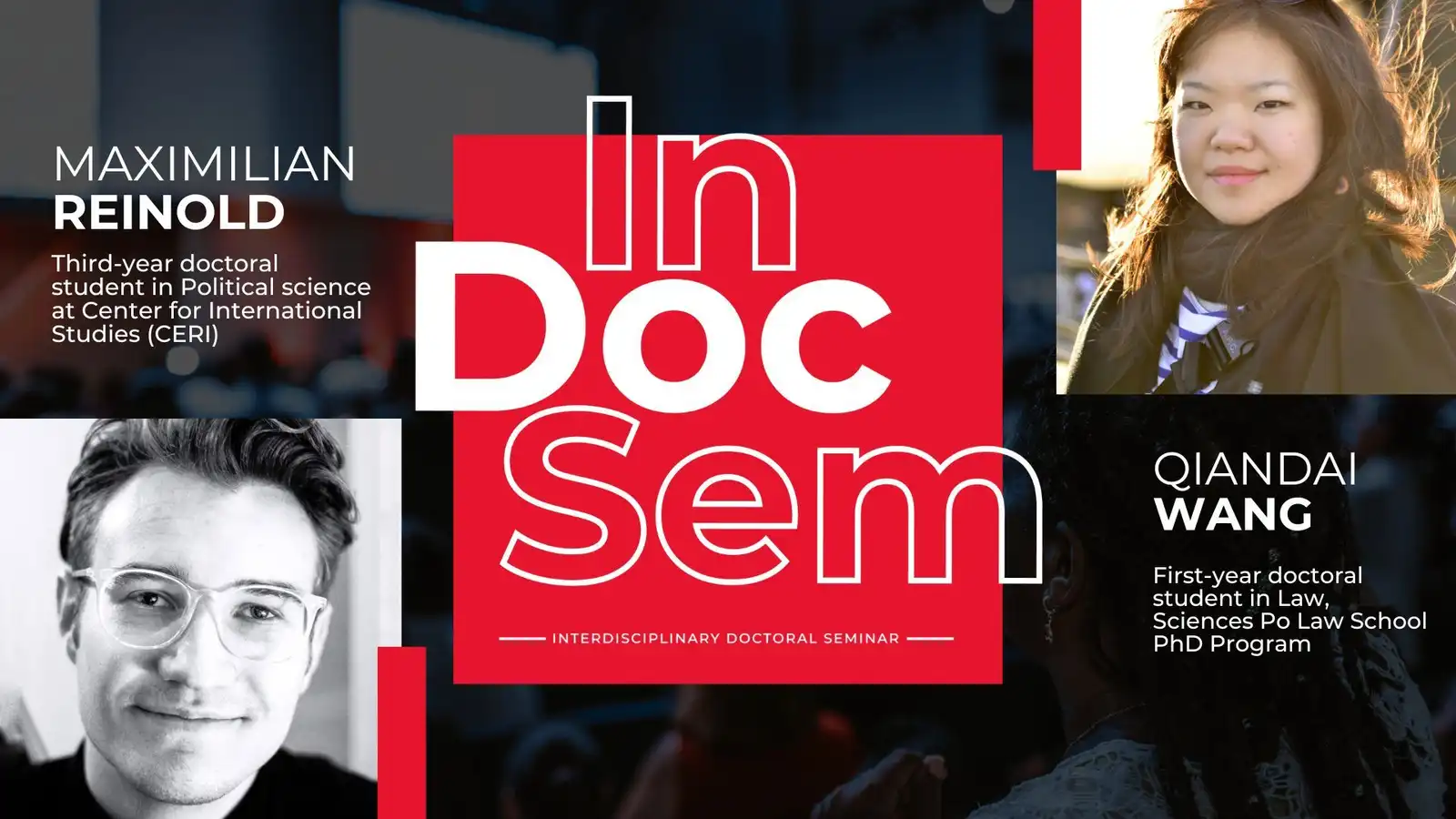Home>InDocSem with Qiandai WANG & Maximilian REINOLD
12.05.2025
InDocSem with Qiandai WANG & Maximilian REINOLD
About this event
12 May 2025 from 14:00 until 15:30
Salons scientifiques
1 pl. Saint-Thomas-d'Aquin, 75007, Paris
This seminar is part of InDocSem, the first interdisciplinary doctoral meeting at Sciences Po, which promotes dialogue across disciplines within the Sciences Po Doctoral School. It aims to challenge approaches and methodologies, connecting doctoral candidates from diverse fields of study around a common topic or area of research, fostering a vibrant scientific community.
Qiandai WANG
First-year doctoral student in Law, Sciences Po Law School PhD Program
Title: International Economic Law after Liberalism: Economic Lawfare on the Edge of Multilateralism
Abstract: This thesis explores the multifaceted features and impacts of economic lawfare on the multilateral economic order founded on free trade. The current global geopolitical backlash has fragilised our belief in globalisation, and the international economic order that promotes economic openness is fluctuating. Since the mid-2010s and especially post-Covid-19, unilateral measures to secure supply chains, combat climate change and maintain technological leadership have become normalised. The US, China, and the EU have engaged with exceptional measures such as economic sanctions, export controls, tariffs, FDI screening, and foreign subsidy investigation in an unprecedented way.
Instead of focusing on condemning unilateral restrictive measures as incoherent, abnormal or wrong, this thesis aims to observe the very process of the weaponisation of legal tools in economic warfare as both destructive and constructive to the multilateral economic order. On the one hand, the enduring economic warfare has eroded the multilateral rules of global economic governance embedded in neutrality and diversity. On the other hand, disruptive unilateral measures in the context of big power competition are the driving forces to correct the unsustainable impacts of liberal globalisation. The thesis seeks to reconceptualise unilateral coercive legal measures beyond the liberal norm and trace why and how various actors deploy such measures in an evolving landscape.
Maximilian REINOLD
Third-year doctoral student in Political science at Center for International Studies (CERI)
Title: Maritime Security Cooperation in the Indo-Pacific Region
Abstract: This thesis investigates why states in the Indo-Pacific region engage in varying levels and forms of maritime security cooperation, especially beyond traditional alliance frameworks. While dominant realist theories suggest that security cooperation is driven by balancing behavior against threats—primarily China’s rise—empirical patterns show a more complex reality. U.S. allies such as Japan and Australia, along with non-aligned and even competitive states, are participating in increasingly dense maritime security networks, including joint exercises and capacity-building with a diverse array of partners. The research asks: What explains the variation in the degree and type of maritime security cooperation in the Indo-Pacific? The dependent variable is the degree and type of maritime security cooperation, measured through exercises, arms transfers, and institutional engagements. To answer this question, the study develops a synthetic framework grounded in the English School of International Relations, integrating both systemic and normative logics. Three independent variables are proposed: (1) relative capabilities, reflecting material power and the ability to shape cooperation; (2) commitment to primary institutions, capturing normative alignment with principles such as freedom of navigation and UNCLOS; and (3) network position, assessing a state's centrality and brokerage role within the existing security architecture. The study hypothesizes that states with stronger capabilities, greater normative alignment, and more central positions in the maritime security network are more likely to engage in broader and deeper cooperation. This approach helps explain why states with divergent alignments and interests nonetheless cooperate under shared frameworks. Rather than mere balancing, maritime cooperation in the Indo-Pacific reflects an effort to reinforce a shared maritime order, institutional norms, and stable interaction patterns. The project thus reframes maritime security networks as not only responses to power shifts, but also as expressions of a networked regional security society.
SAVE THE DATE
Climate and multilateralism
Monday 16 June 2025 (16:00 - 17:30)
InDocSem with Charlotte DESMASURES and Christos ZOIS
About this event
12 May 2025 from 14:00 until 15:30
Salons scientifiques
1 pl. Saint-Thomas-d'Aquin, 75007, Paris